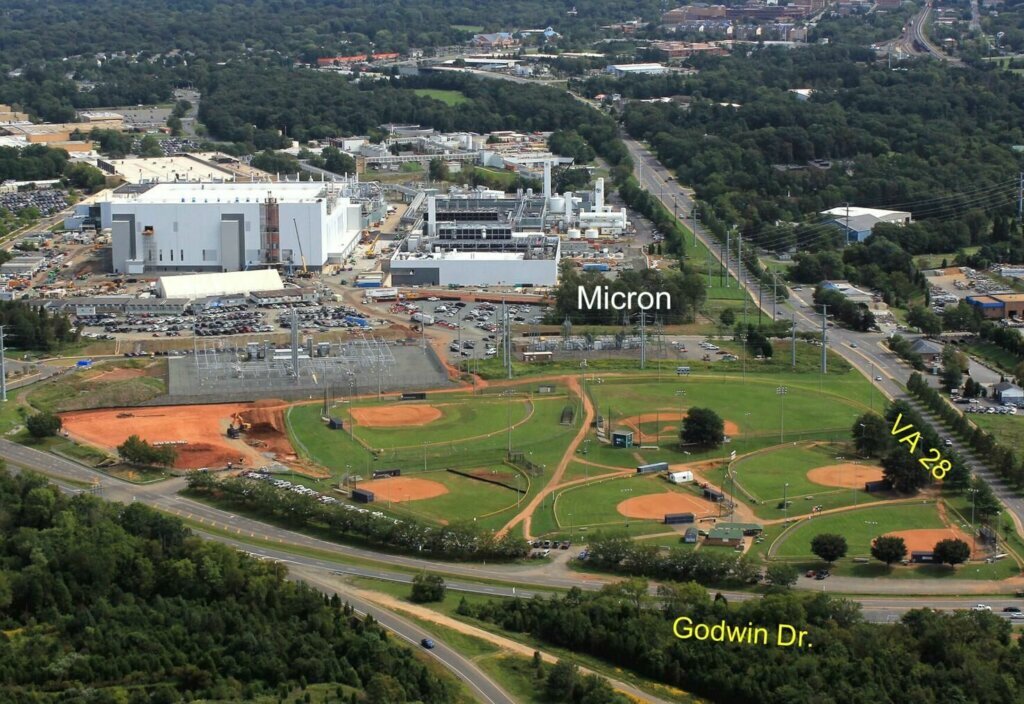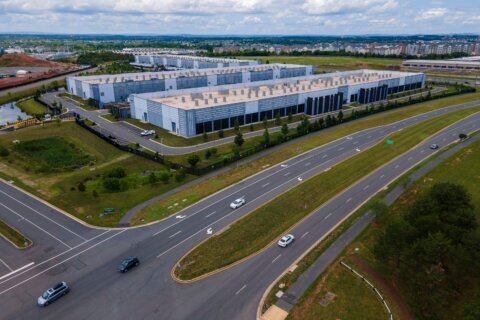This article was written by WTOP’s news partner InsideNoVa.com and republished with permission. Sign up for InsideNoVa.com’s free email subscription today.
This article was republished with permission from WTOP’s news partner InsideNoVa.com. Sign up for InsideNoVa.com’s free email subscription today.
The Manassas City Council pre-approved the sale of 18.12 acres of city-owned land at the northeast intersection of Route 28 and Godwin Drive Monday night, giving Micron Technology Inc. the option to purchase the property at any point in the next three years for $14.1 million.
The property, which currently serves as the site of the Greater Manassas Baseball League’s E.G. Smith Complex, will remain as the league’s home for two years after Micron decides to move forward with the purchase, if it does at all.
The company, which is in the midst of a $3-billion expansion adjacent to the baseball and softball complex that it says will add 1,100 jobs by 2030, has not said what it might use the property for, but according to the agreement it’s considering constructing at least one new building and additional parking. The resolution pre-approving the sale passed the council unanimously.

“This is one of the best economic things that has happened to the city,” Councilmember Mark Wolfe said before voting on the option. “This deepens our relationship with Micron and obviously they have to decide to exercise their option and we’re hoping that they do so. The sooner the better.”
Before Micron decides on whether to purchase the property, the Boise, Idaho-based company will first pay a non-refundable $250,000 option fee to the city. If the company does ultimately buy the property, that money will go to the ultimate sale price.
In addition to the contract option for Micron, the council also passed a resolution saying that the city “desires” to relocate GMBL “as soon as practicable, and prior to Micron completing the purchase…” At a recent Land Use Committee meeting, a number of councilmembers hinted that the city might be close to securing a new property for the league either within the city limits or just outside, but said that it’s new home would not be at the addition to Dean Park.
If Micron does decide to exercise its purchase option, it will be the latest in a series of huge investments in Manassas for the chip manufacturer that’s operated a plant in the city since 2002. The company has completed the first phase of its $3 billion expansion, which was announced in 2018 and was assisted by $70 million in grants from the Commonwealth. The company’s also taken on a bigger profile amidst an ongoing global shortage of semiconductors, which are used in new cars, defense products and some household electronics. Micron is one of the biggest semiconductor manufacturers in the world and the biggest exporter in Virginia based on value.
In May, U.S. Secretary of Commerce Gina Raimondo and Sen. Mark Warner came to the facility to talk up the importance of boosting domestic semiconductor manufacturing, highlighting the expensive and complex foundries called “fabs” in which the chips are produced. Micron operates a 175,000-square-foot fab in Manassas.
But the sale would also mark the end of GMBL’s 40-year run at the site. The league has been located on the property since 1981, when the land was donated to the city by IBM with the express direction that it only be used for baseball and softball. In 2011, IBM lifted that restriction on the land at the City’s request and it was targeted for economic development. But according to Councilmember Mark Wolfe, the only significant interest in the property came from residential developers.
At a public hearing on the possible sale earlier this month, hundreds of parents, coaches and players rallied to demand that the council either not approve the sale or come up with a concrete plan to keep the league nearby. But Economic Development Director Patrick Small said that the $14.1 million price was above market value. Revenues from the sale would go to the city’s Parks, Culture and Recreation department.
“What Micron is paying for is something that no other business and developer would pay for. … They’re paying a premium so that the city will have the resources to find a solution working in partnership with our community, our residents, GMBL and others, to develop new property. And Micron has given you time to do that,” Small said.
A statement posted by GMBL said the league was “heartbroken” over the potential loss of its home, but that it understood the economic realities facing the council.
“We respect the City Council’s decision to sell the property …. We are pleased that the City passed a resolution stating their desire to relocate the GMBL facilities as soon as practical,” the statement read.
Last week, League President Colby Poteat told InsideNoVa that he just wanted the council members who promised to find a new home for the league to “follow through with what they said.”







